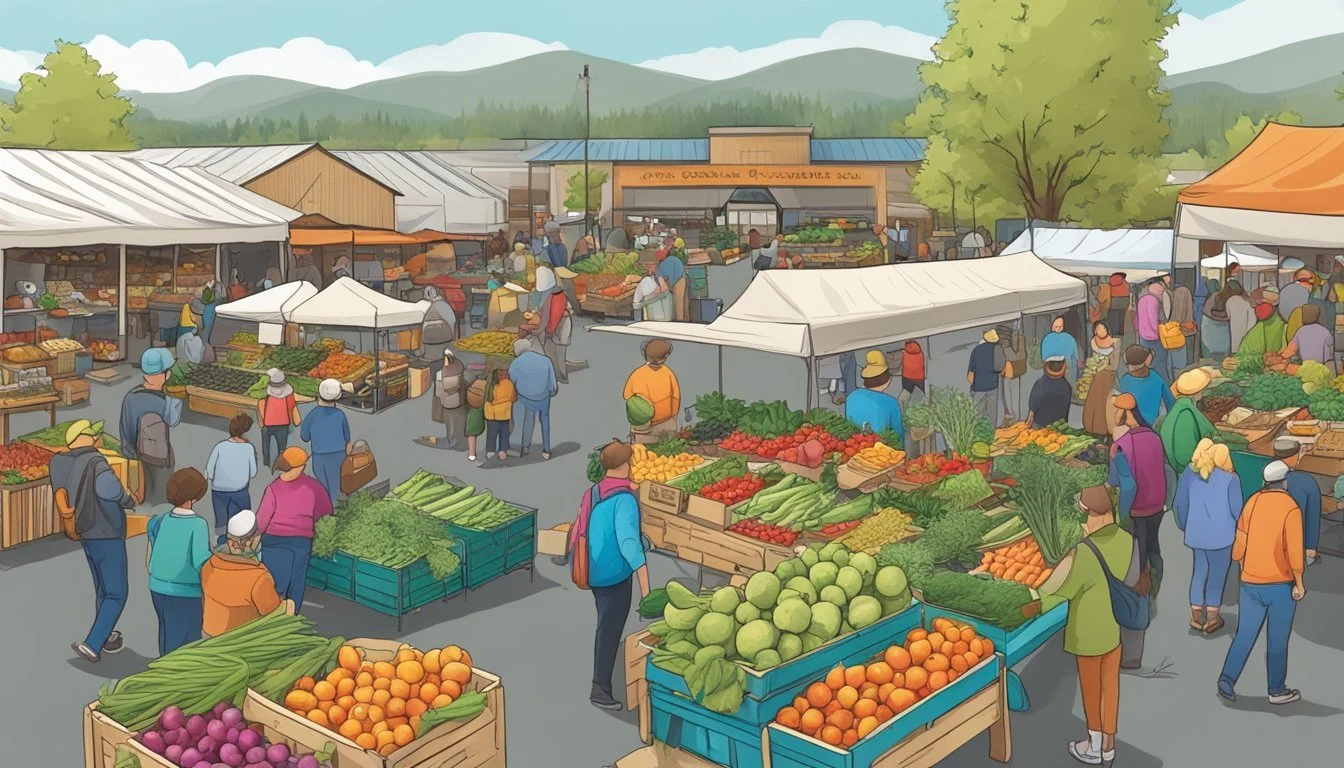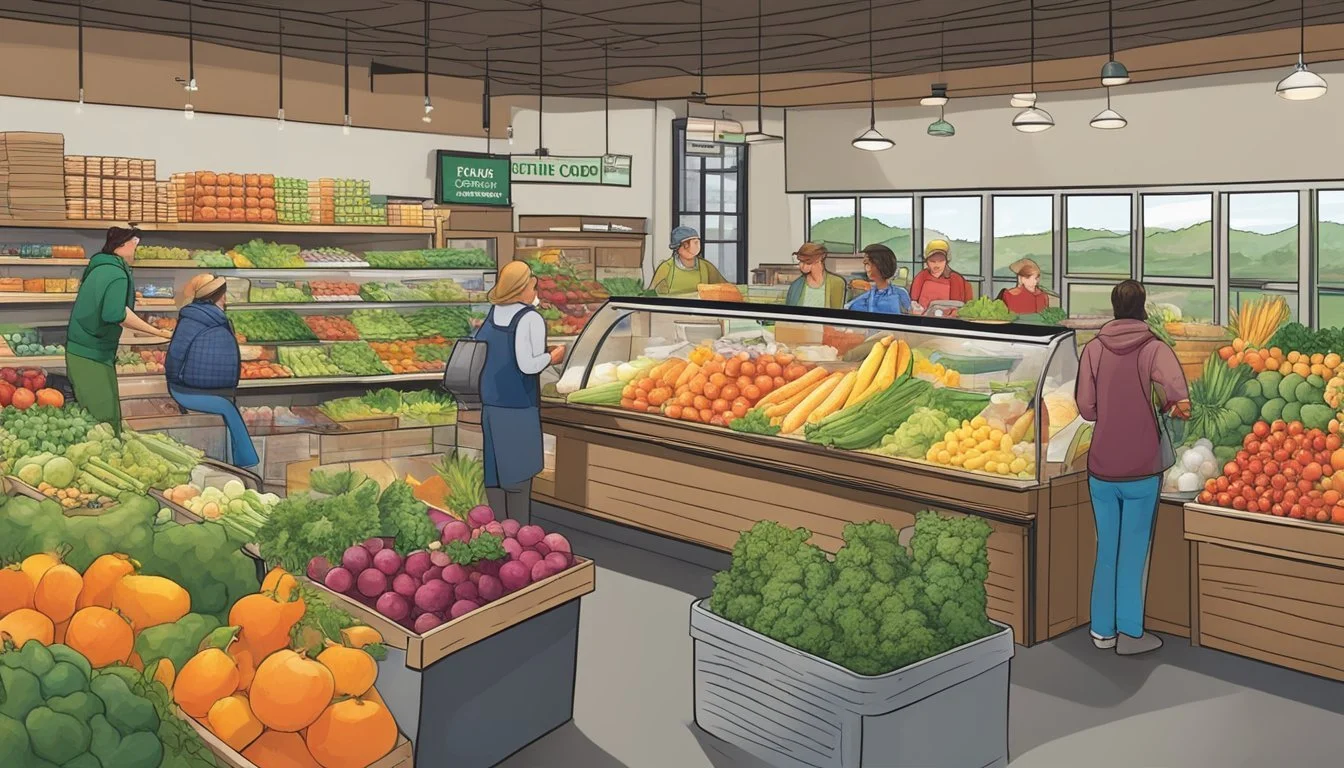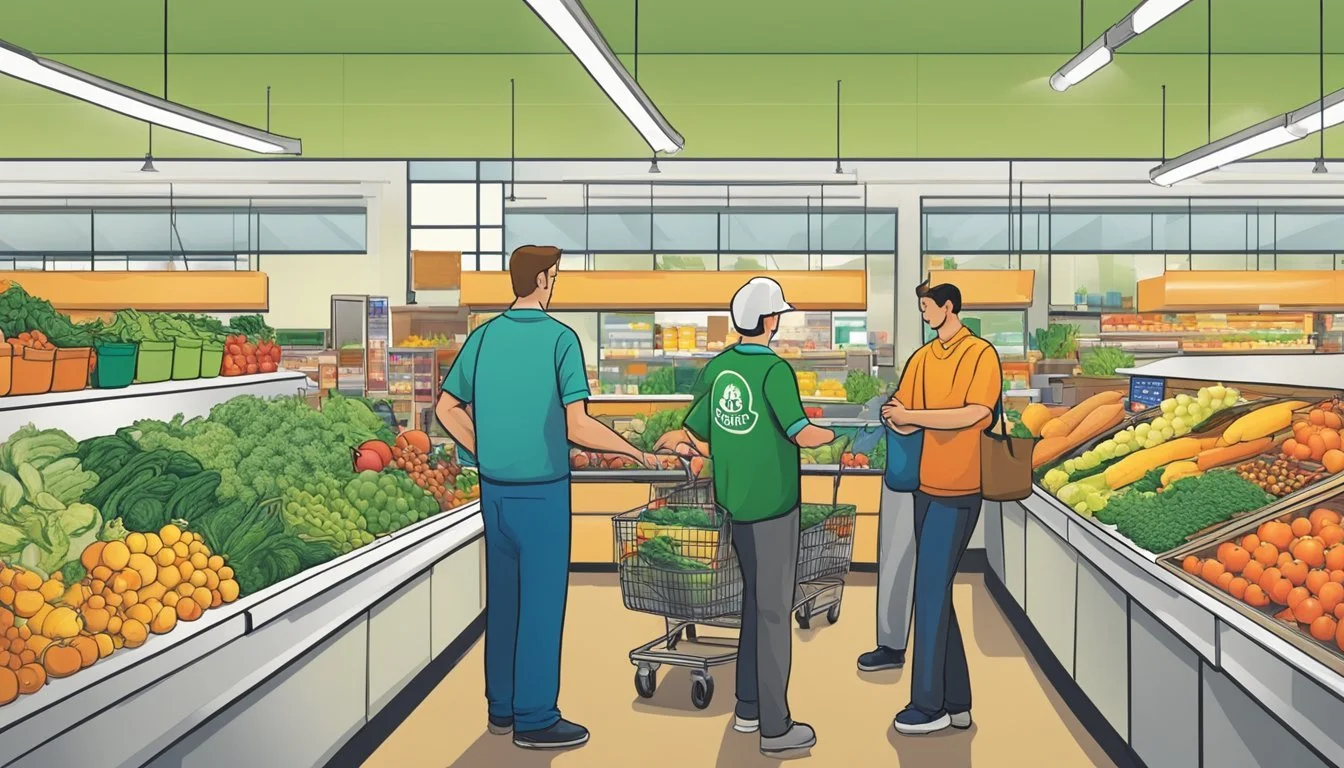Guide to Food Co-Ops in Spokane Valley, WA
Your Essential Resource
Spokane Valley, WA, located in the heart of the Inland Northwest, is becoming a notable area for food co-ops—a forward-thinking approach to shopping for groceries that emphasizes community and sustainability. These cooperative grocery stores are owned and managed by members who share a commitment to providing access to healthy, locally-sourced food. By operating primarily for the benefit of their members rather than external shareholders, food co-ops in the region are fostering a robust local food system.
Main Market Co-op stands out as Spokane's only food co-op, where anyone can shop and become a member. This non-profit, full-service natural food store emphasizes locally-produced and organic products, underpinning the cooperative ethos of community support. Additionally, initiatives such as the "Produce Match" program reflect a dedication to making healthy foods more accessible to a broader demographic, including individuals using EBT.
LINC Foods (Local Inland Northwest Cooperative) further exemplifies the community's commitment to sustainable food systems. As a farmer and worker-owned hub, LINC Foods connects local producers with consumers, strengthening the economic and social ties within Spokane. Through these and other food co-ops, Spokane Valley is actively contributing to a vibrant ecosystem where the emphasis is placed on the wellbeing of the environment, the local economy, and the health of its residents.
Understanding Food Co-Ops
A food cooperative, or food co-op, is a type of grocery store that operates on a membership-based system. Co-ops are unique in that they are owned and managed by the community of shoppers and workers who use the services of the store. These members have a say in the operations and decisions of the co-op, emphasizing democratic control.
Co-ops are committed to sustainable practices and often focus on providing local, organic, and ethically sourced products. This aligns with their mission to support local economies and promote environmental responsibility. Food co-ops in Spokane Valley are part of a larger movement prioritizing the well-being of their communities and the planet.
Key features often include:
A focus on local farmers and producers
An emphasis on healthy, organic options
Sustainable and transparent sourcing
Feature Description Local Producers Co-ops often source from local farms, supporting the local economy. Member Involvement Members play a critical role in governance and operations. Sustainable Choices The emphasis is on long-term environmental sustainability.
Each food co-op is assigned a unique identifier or ID, which assists in tracking its transactions and member activities. This allows co-ops to remain accountable and ensure that members' needs are met effectively.
Co-ops foster a sense of community by creating spaces where people can gather, share knowledge, and build relationships based on mutual respect and shared values. Through these cooperative models, Spokane Valley residents have access to quality food while contributing to a food system that they believe in.
Main Market Co-Op Overview
Main Market Co-op serves as a cornerstone in Spokane, WA, for residents who value high-quality, local food and community-oriented shopping experiences. It operates as both a full-service grocery store and a hub for local produce and products.
History and Mission
Main Market Co-op was established in 2010 at the intersection of Main and Browne with a strong focus on community and sustainability. Its mission is to foster a thriving local food system by providing a platform for local farmers and producers. The co-op has seen substantial growth, with membership numbers reaching 9,000, emphasizing its significant role in the downtown Spokane area.
Products and Services
The co-op presents a diverse range of products, highlighting organic groceries, freshly made deli offerings, and an array of services. Shoppers can find:
A full salad bar
A hot bar with rotating options
House-made soups
Burritos and bowls made to order
Specialty desserts and baked goods
Moreover, the Main Market Co-op's commitment to high-quality products and services is evident in the care they take to source items and in the freshness of their ready-to-go food sections.
Membership and Benefits
Membership at Main Market Co-op is open to anyone and brings with it a variety of benefits, contributing to an enhanced shopping experience. Members can enjoy:
Special discounts
Voting rights on important co-op decisions
A stronger connection to the local food system
The co-op's focus on membership underscores its dedication to community involvement and the economic well-being of the Spokane region.
Local Food Impact
In Spokane Valley, WA, a dedicated network of local farms and cooperatives like LINC Foods plays a pivotal role in shaping a more sustainable local food system. Their efforts ripple through the local economy, supporting not only the agricultural sector but also encouraging community-wide benefits.
Local food initiatives often boost economic growth by enabling farmers to retain a higher share of revenue. In addition, they foster sustainability by promoting environmentally friendly farming practices. Local farms in the region, such as 9 Mile Farms, are committed to ethical and sustainable methods, which leads to a reduced carbon footprint compared to larger agribusiness operations.
A key component is the support of local co-ops. These cooperatives, consisting of farmer and worker owners, centralize and streamline the distribution of food. LINC Foods is exemplary, with their vision of strengthening the local food system while contributing to a vibrant ecosystem. This approach ensures that Washington State's rich agricultural tradition is preserved and that the local economy thrives through the support of region-specific initiatives.
Furthermore, food co-ops provide education on the value of local produce, transforming consumer habits towards more ecologically and socially responsible choices. This collaborative effort among different stakeholders in Spokane, WA enhances community health and resilience while prioritizing sustainable development.
By fostering this cohesive network, Spokane Valley is reinforcing its commitment to a robust, vibrant local food system that is environmentally regenerative and inclusive.
Grocery Selections
Shoppers in Spokane Valley, WA seeking a diverse range of groceries can rely on local food co-ops, which are known for their emphasis on quality and variety. Whether it’s fresh produce or specialty diet foods, co-ops offer an expansive selection curated to meet the community's needs.
Produce Quality
Food co-ops prioritize fresh, often local produce, with an array of fruits and vegetables that often surpasses typical grocery store selections. Seasonal selections are a specialty, often showcasing the freshest berries, vegetables, and fruit available. The co-op’s commitment to highest quality produce means that customers are likely to find organic and non-GMO options that support local farms.
Meat and Dairy Range
The selection of meat and dairy products at food co-ops commonly includes a broad range from local sources. Shoppers can expect to find antibiotic-free and pasture-raised meats alongside a variety of dairy products, including milk, cheeses, and eggs. This ensures that customers have access to some of the freshest and most ethically sourced animal products.
Natural Foods and Groceries
Dedicated to health and sustainability, food co-ops are a reliable source for natural foods and groceries. Shelves are typically stocked with organically produced staples, including grains, nuts, and health-focused snacks. They often carry environmentally friendly cleaning and personal care products, broadening the scope beyond just edibles.
Special Dietary Offerings
Catering to special dietary needs is a hallmark of food co-ops, which offer a variety of options for those with specific requirements. Gluten-free, dairy-free, vegan, and vegetarian products are often available here than in traditional grocery stores. The co-op’s deli is also known for its range of ready-to-eat options suitable for various dietary preferences.
Prepared Foods and Deli
Spokane Valley's food co-ops offer a convenient and health-conscious solution for those seeking nutritious meals on the go. The delis provide a range of ready-to-serve options, from fresh salads to hot, hearty meals.
Grab & Go Options
The Grab & Go section caters to the busy individual with a selection of pre-packaged meals. Choices often include sandwiches, wraps, and salads, crafted to provide a quick yet healthy alternative to traditional fast food.
Lunch Choices
For a satisfying midday meal, customers can opt for freshly made burritos and bowls. These lunch offerings are not only flavorful but also packed with nutrition, giving patrons a wholesome boost during their lunch break.
Salad Bar and Hot Bar
Patrons searching for variety and freshness will be pleased with the salad bar and hot bar. The salad bar is abundant with crisp vegetables and an array of toppings, while the hot bar invites customers to fill their plates with warm, often locally-sourced, entrees and sides.
Shop Local, Support Community
In the Spokane area, the emphasis on community-centric commerce has seen a rise, with food co-operatives leading the charge. The Main Market Co-op stands as a paragon of this movement, operating as a full-service natural food store. The involvement of the community is evident as the store is both owned and managed by its members, but its doors are open to all shoppers.
By choosing to shop at a local co-op, customers directly bolster the local economy. Profits from purchases go back into the community, supporting local farmers and producers. This not only ensures that the money stays within the community but also contributes to the local food system’s sustainability.
Local Farms Affiliated with Main Market Co-op:
Apple Cart Fruit
Bunny Laine Fruit
Filaree Fruit
Grandpa's Home Place
Whitestone Mountain Orchard
M&A Orchards
Choosing to support these local farms means choosing to invest in Spokane's future. Through collaboration, these farms pool resources and expertise, which is a testament to the community's power in agriculture.
Moreover, co-ops like Main Market provide more than just groceries; they foster an environment for local events, such as wine tastings, that underscore their role as community hubs. Weekly gatherings and in-store events become loci for social interaction, education, and communal growth.
Ultimately, shoppers in Spokane who choose co-ops are making a conscious decision to enhance their community's economic and social wellbeing. They become part of a cycle that nourishes the community as much as it does their own households.
Exploring the Spokane Valley Co-Op Scene
The Spokane Valley offers a unique array of cooperative grocery options that emphasize local, organic, and community-driven values. Here, shoppers can find a variety of products ranging from freshly made meals to locally-sourced produce that supports the regional food system.
Main Market Co-Op
Main Market Co-Op stands as a central hub for organic groceries in Spokane. Located at 44 W Main Ave, this cooperative grocery store not only provides a full selection of organic products but also a deli with a wide array of food options. Patrons can enjoy:
Freshly made grab-and-go items
A full salad bar
A hot food bar with rotating soups
Made-to-order burritos and bowls
Specialty desserts and baked goods
Committed to nourishing the community, Main Market Co-Op contributes to a resilient Inland Northwest food system, one meal at a time.
Other Notable Co-Ops
While Main Market holds a significant presence, Spokane Valley's cooperative scene includes other entities that focus on community and sustainability. These include:
LINC Foods, a distributor that connects local farmers to markets, ensuring that residents have access to fresh, regional produce.
Okanogan Producers Marketing Association, serving as a cooperative platform for farmers to directly market their products, increasing the visibility of local food sources.
Farmers' Markets, which serve as a gathering place for multiple producers, offering a variety of local produce and goods to the community.
Each of these co-ops and associations plays a critical role in Spokane Valley's food ecosystem, supporting local agriculture and providing residents with healthier food options.
Engagement and Resources
Food co-ops in Spokane Valley, WA, provide a myriad of resources and engagement opportunities to the community. These outlets aim to educate, involve, and support both the local population and farmers through a variety of initiatives.
Educational Resources
Workshops and Training: Co-ops like LINC Foods offer educational workshops for both consumers and producers, sharing knowledge about sustainable agriculture and local food systems.
Informational Material: Many co-ops provide materials and guides that detail best practices for local farming, as well as information about the nutritional and environmental benefits of supporting local food systems.
Community Events
Farmers Markets: Regular farmers markets are organized, fostering direct connections between farmers and the community.
Co-op Meetings: Open meetings are often held by food co-ops, serving as a platform to discuss initiatives and developments within the local food economy.
Volunteering Opportunities
Co-op Farms: Opportunities for community members to volunteer at co-op associated farms, providing hands-on experiences in sustainable farming.
Event Staffing: Food co-ops recruit volunteers for various events, including educational seminars and community outreach programs, allowing individuals to engage more deeply with the local food culture.
Plan Your Visit
When planning a visit to Spokane Valley's food co-ops, it's essential to have up-to-date information on their locations, operating hours, parking facilities, and accessibility options. This ensures a seamless and enjoyable experience.
Location and Hours
Main Market Co-op
Address: 44 W Main Ave, Spokane, WA 99201
Hours:
Monday to Friday: 8:00 AM - 8:00 PM
Saturday: 8:00 AM - 8:00 PM
Sunday: 9:00 AM - 7:00 PM
Conveniently located in downtown Spokane, the Main Market Co-op is easily accessible to both residents and visitors. Before visiting, one may wish to consult a map to determine the best route, especially if they are unfamiliar with downtown Spokane.
Parking and Accessibility
Parking:
Main Market Co-op offers parking options nearby, including street parking and several parking garages in close proximity to the store.
Accessibility:
The co-op is committed to being accessible to everyone. There are wheelchair-accessible entrances and aisles, ensuring that persons with disabilities can navigate the store comfortably.
Visitors are encouraged to check for any parking fees or time-limited spaces and are advised to read all posted signage to avoid parking fines.
Customer Reviews and Feedback
Spokane Valley hosts several food co-ops that enjoy feedback from their community. At Main Market Co-op, reviews often highlight the courteous service provided by employees. One customer mentioned, "The cashier was incredibly helpful," reflecting a pleasant shopping experience.
Huckleberry's Natural Markets has garnered approval for its selection of health-oriented products. Customers regularly note the variety of organic and local goods available, with one stating, "The organic produce selection is unmatched."
A unique element of these co-ops is the emphasis on local produce, something that customers value greatly. A review for Main Market Co-op praised this aspect, "Love the focus on local farmers' produce!" Such feedback reiterates the strong community-driven mission these establishments uphold.
Co-op Name Customer Highlight Employee Mention Main Market Co-op "helpful service" "cashier gave credit" Huckleberry's Market "excellent selection" Not specified
Feedback also extends to the co-ops' commitment to sustainability and community outreach, which meshes well with Spokane's ethos. Customers appreciate the co-ops' role in promoting local food futures and supporting nearby academic institutions, like Gonzaga University.
While most reviews are positive, they also provide constructive criticism that the co-ops use to improve customer satisfaction. As these co-ops continue to serve Spokane Valley, they remain responsive to the needs and inputs of their patrons.
Future of Food Co-Ops in Washington State
Food co-operatives in Washington State are anticipated to continue playing a pivotal role in shaping a sustainable future. They embody a bridge connecting the community and local producers, emphasizing equitable food access and economic empowerment. The inclusive nature of these co-ops acts as a cornerstone for community-led growth and nurtures a more transparent food system.
Community Impact: These enterprises prioritize products from diverse-owned businesses, championing inclusivity. Programs like the Inclusive Trade initiative fortify this ethos by actively promoting and supporting products by women, people of color, LGBTQIA+ individuals, veterans, and people with disabilities.
Sustainable Practices: Food co-ops in the region have been at the forefront of combating industrialized agriculture by connecting consumers with local, small-scale farmers. This reduces the carbon footprint associated with long-distance transportation and encourages a localized, resilient food economy.
Trends & Growth:
Evolution: New co-op models continue to emerge, giving rise to worker-owned and operated food co-ops.
Education: Initiatives like engaging sessions with experts are key in informing both members and the broader public about future developments and the larger role co-ops play in a sustainable food system.
Year Percentage of New Worker Co-ops Pre-2010 1% 2016-2019 47%
Washington State's food co-ops represent a dynamic movement likely to expand as more individuals recognize the value of community-centric, sustainable food sources. Their growth signifies a shift towards a more connected and resilient food system, reflective of a broader national trend towards cooperative economics and sustainability.










